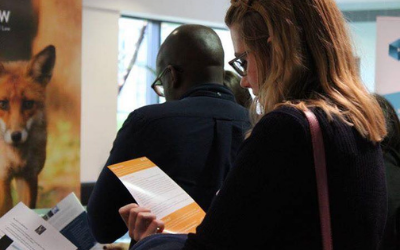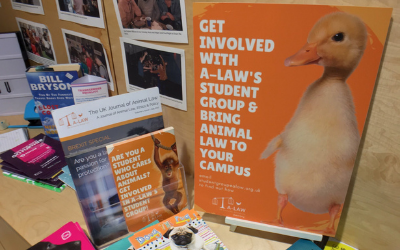David Thomas
David Thomas is a solicitor. He has for many years been legal consultant to several animal protection and human rights NGOs and has acted in numerous test cases both in the UK and Europe.

David Thomas is a solicitor. He has for many years been legal consultant to several animal protection and human rights NGOs and has acted in numerous test cases both in the UK and Europe. Prior to moving to the voluntary sector he was a litigation partner in a West End firm. He is a consultant to Bindmans LLP and for several years was legal officer to Child Poverty Action Group. He is a former chair of the RSPCA, trustee of Compassion in World Farming and member of the advisory panel for Burma Campaign UK and is currently a trustee of a Casa Alianza UK, a street children charity. He has written extensively about legal and related issues, especially in the campaigning context, and used to teach judicial review and human rights law, primarily in the context of welfare benefits. He is a former member of the Law Society’s mental health and disability committee and of the Legal Services Commission panel advising on the grant of legal aid in public interest cases.
Did you always know you wanted to be a lawyer?
Not exclusively (footballer, cricketer or tennis player came first!) but it always interested me, ever since watching Crown Court on the television… I enjoy building a case and the range of intellectual, tactical and human challenges.
When did you decide you wanted to practice in Animal Law?
I have always been passionate about using the law to prevent or more realistically minimise the exploitation of animals. Sadly, man’s inhumanity to man, awful though it is, is dwarfed by man’s inhumanity to other animals, usually sanctioned by the law. I am passionate about human rights too – I don’t think one can be selective about opposition to exploitation and injustice – but there are far fewer lawyers willing to fight on animals’ behalf, and, with no legal aid and many organisations running on very tight budgets, there is not much money around.
I also feel strongly that there is an educative task to perform – most organisations don’t appreciate how use of the law, in a variety of different ways, can help them achieve their objects (and that this can actually be very cheap).
To state the obvious: animals have no voice of their own. There is something satisfying about doing something for ‘clients’ who have no idea that you are doing it and will never thank you.
How did you get into Animal Law?
I had volunteered for my local RSPCA as a youngster and been a member of its national Council and I then became involved with legal issues for the BUAV, again on a voluntary basis. As trustee of Compassion in World Farming legal issues were also to the fore.
How much of your practice is Animal Law?
Probably about 70%.
What is the rest of your practice?
I do some human rights work (e.g. street children) and am a consultant to Bindmans. I have just been appointed a part-time judge, hearing social security cases.
How is your day at work spent?
It varies, obviously. There is some litigation, here, in the EU and further afield (much animal law is international, which adds to the interest and complexity); general advice; constructing legal arguments which hopefully will not require court proceedings; lobbying; drafting legislation; libel-reading campaign and fundraising materials; drafting letters; working on undercover investigations; writing articles (law and ethics) and contributing to books; media work; public speaking/debates. It is where law meets politics, science (always relevant in animal welfare work), campaigning, ethics.
What animal welfare cases are you most proud of?
I have done a lot of freedom of information cases, here and in Europe. They can be challenging but if successful are really important, because information is the lifeblood of campaigning. Judicial reviews can be very difficult in relation to animals but they have their place in holding the Government to account and can be a vehicle for publicity (sometimes a well-reasoned threat of JR can pay dividends). My clients have recently intervened in important cases in Canada and the European Chemicals Agency. It is important to have a voice in these cases as intervener because, outside the UK, the rules of standing to bring a case can be very restrictive. A case about the right to peaceful protest was also very important.
Do you enjoy the work?
Lots of frustrations and inequality of arms with governments and industry but, yes, I do enjoy it very much. Success, which can be measured in lots of different ways, can make a real difference to the lives of large number of animals.
How can a new lawyer steer their practice towards this area?
It is not easy, because there are few openings outside the very big organisations. The way I got in was by doing legal and other work on a voluntary basis and that is still probably the best way to show what one can do and establish its value.
What tips would you give to students who want to practice in this area?
A lot of the advice would be common to students in any area of law: try and absorb as much knowledge as possible at college and keep abreast of what is happening in the legal press; seize opportunities to apply your knowledge and see how it works in real life, for example volunteer at pro bono clinics, Citizens Advice Bureaux, Law Centres, charities etc or get work experience at a law firm or chambers if you can. Don’t forget that there are really interesting legal careers in local and national government and they certainly need people who have an interest in animal welfare issues.
I found it took time to make sense of the law because at university one learns the theory of different legal areas in hermetically sealed boxes but in real life, as above, problems can raise many different dimensions. Therefore, the sooner you start applying the law and joining the threads together to solve problems, the sooner it will make sense and seem real.
Start meeting people and talking to them about what practice is really like. There are all sorts of special interest lawyer groups like ALAW, Young Legal Aid Lawyers, Friends of the Earth, and Clientearth. You can also get involved in campaign groups and attend meetings. It is a great way of learning the latest on policy/legal developments and it can be motivating to meet lawyers who share your interests and can hopefully act as mentors.
Keeping an open mind is worthwhile. Although clearly it is important when you’re going for jobs to have a strong interest in the firm’s areas of practices, while you are still learning don’t close your mind to other areas or options. Even if you do feel stuck in one practice area, it is worth remembering that with a little determination you can move sideways or cross-qualify at a later stage.
Follow Us !
WE NEED YOUR SUPPORT
We rely upon membership income and donations to carry out our work. Please join us or donate and support our work.
Become a Volunteer! If you like what we’re doing…
why not find out about the different ways you can get involved in our important work?






